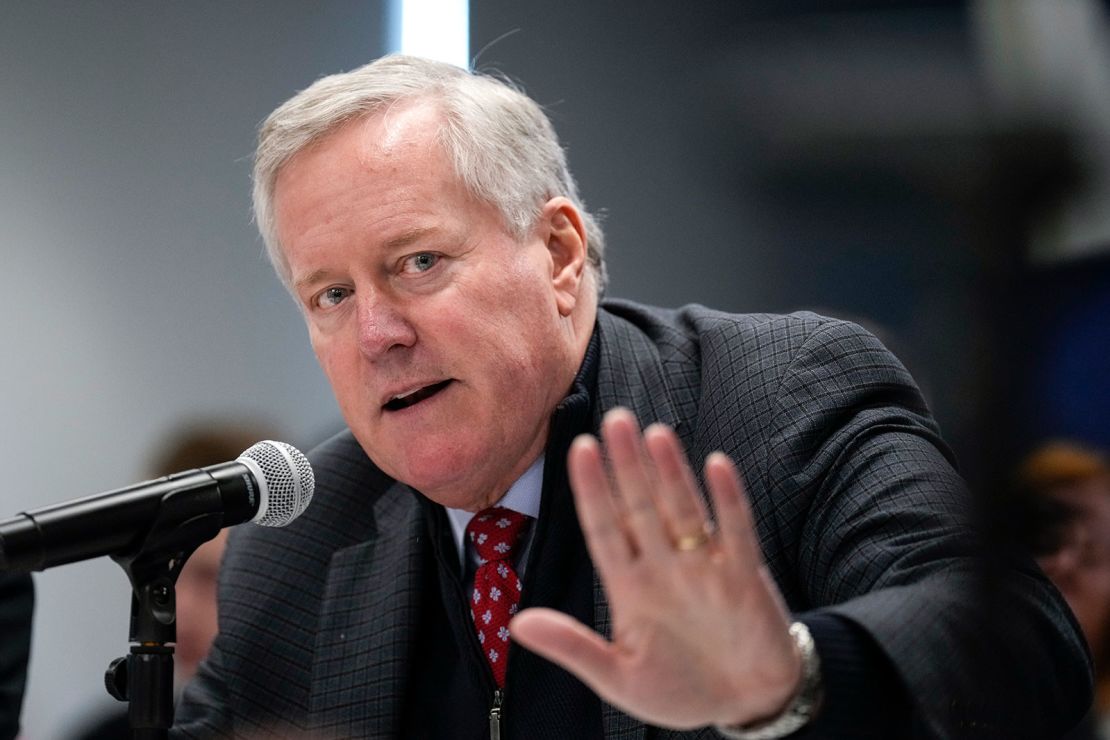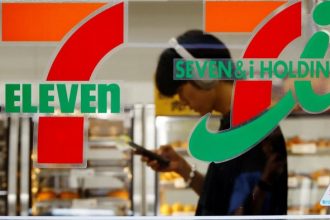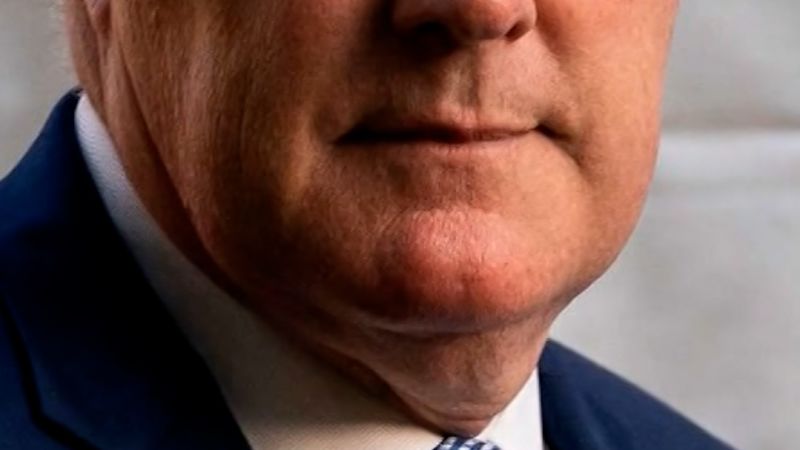Donald Trump’s former chief of staff Mark Meadows has been walking a tightrope, trying to strike a careful balance of complying with federal investigators who are using his testimony to prosecute Trump, while not crossing any red lines that would jeopardize his influential political relationships with congressional Republicans.
That balancing act was on full display Tuesday night: Hours after an ABC News report that Meadows had been granted immunity and met multiple times with special counsel Jack Smith’s team, Meadows was spotted at a right-wing gala in Washington, DC, mingling with well-connected Republicans, according to two people in attendance.
Meadows provided information to federal investigators in both the 2020 election subversion and the classified documents investigations after receiving immunity to comply with a subpoena, sources familiar with the matter told CNN. He didn’t get blanket immunity but instead received assurances he wouldn’t be prosecuted for what he shared with investigators, the sources said.
As a founding member of the House Freedom Caucus who spent years in Congress as a partisan attack dog, Meadows still wields significant influence among conservative lawmakers. But his clout within pro-Trump circles could be threatened if Republicans suspect that he turned on the former president.
“He’s just trying to be a good faith operator and work with them,” a person close to Meadows told CNN about his interactions with special counsel prosecutors. “That doesn’t mean that he’s selling anybody out or flipping.”
As recently as this month, Meadows met privately with House Republicans, both on and off Capitol Hill, about the race for House speaker— pushing GOP members toward supporting more conservative candidates who are aligned with Trump, sources familiar with the meetings told CNN.
And yet, Meadows is a key witness against Trump in his criminal cases. It’s one of the reasons the bipartisan January 6 committee said Meadows was “uniquely situated to provide critical information” about the attempts “to delay or prevent the peaceful transfer of power.”
After ABC News published its report, Meadows’ attorney George Terwilliger said in a statement, “I told ABC that their story was largely inaccurate. People will have to judge for themselves the decision to run it anyway.” Terwilliger did not say which parts of the story he thought were inaccurate.
Meadows did not respond to requests for comment. Meadows’ legal team declined to comment for this story.
Since Trump left office, Meadows has kept close ties with many of the former president’s allies in Congress. He has been a crucial player over the last several months in advising right-wing holdouts on how to exact concessions from House GOP leadership, as CNN reported in May.
During the most recent speaker fight, Meadows’ DC-based think tank, the Conservative Partnership Institute, where Meadows is senior partner, played a significant role in boosting the failed speakership candidacy of fellow Freedom Caucus member Jim Jordan, coordinating with members, organizing calls and strategizing with right-wing activists about ways to whip up support for the Ohio Republican, sources told CNN.
When Jordan was asked Thursday in a Newsmax interview whether Meadows had turned on Trump, he replied, “I don’t believe Mark would do that. Mark is a good friend, but I don’t know. But I trust that Mark – Mark thinks the world of President Trump, as do I.”
But Meadows also provided damning text messages to the January 6 committee in fall 2021, and gave crucial grand jury testimony to Smith’s team this year – and is currently fighting his own criminal charges in Georgia. (He pleaded not guilty to two state crimes.)
The Georgia indictment accuses Meadows of working with Trump to pressure Georgia election officials to interfere with the vote tally, and says he was involved in some of the fake-elector efforts. Trump’s federal indictment also references Meadows’ emails about the electors and mentions his conversations with Trump about voter fraud allegations – making it likely that Meadows could be a trial witness on those topics.
Advisers to the former president insist that they’re not concerned about Meadows’ level of cooperation, at least for now. They argue it’s unclear how valuable Meadows’ information could be in a trial setting, and they tell CNN that they’re taking Terwilliger’s statement about the ABC News story at face value.
“I think from our standpoint, we’re just taking his word for it. We’ve been pushing out his lawyer’s statements publicly,” one Trump adviser told CNN.
CNN reported in June that Meadows gave grand jury testimony in Smith’s probe, and that he was asked about efforts to overturn the 2020 election and Trump’s handling of classified documents. Smith has since charged Trump in the two separate investigations.
In front of the grand jury, Meadows was immunized from prosecution by a federal judge when it became clear he planned to assert his Fifth Amendment rights to decline to answer questions about the 2020 election, sources told CNN.
Meadows also provided information to Smith’s team – about the election and classified documents – during interviews conducted under what’s called a proffer agreement, which provides some legal protection, the sources said.
Meadows’ grand jury appearance occurred before Smith charged Trump – and before Fulton County District Attorney Fani Willis secured indictments against Trump, Meadows, and 17 others in her state-level election subversion case in Georgia.
Terwilliger, Meadows’ attorney, has previously said publicly, “Mr. Meadows has maintained a commitment to tell the truth where he has a legal obligation to do so.”
But Meadows told investigators that he didn’t believe the 2020 election was stolen and that Trump was being “dishonest” when he declared victory on Election Day shortly after the polls closed, according to ABC News. The report says Meadows notified Trump by mid-December 2020 that his lawyer Rudy Giuliani couldn’t prove his voter fraud claims.
“Obviously, we didn’t win,” Meadows told Smith’s team, according to ABC News.
That is the opposite of what Trump and many of his congressional allies are still saying about the 2020 election. As recently as Tuesday night, Trump posted on social media that there was a “rigged election” in 2020. And Rep. Mike Johnson of Louisiana was elected House speaker on Wednesday – he has a well-documented history of 2020 election denialism.
Regardless of what Meadows told investigators in private about the 2020 election and classified documents, he is still in the fold with many House Republicans, including many who also cast votes to throw out the results from Pennsylvania and Arizona, where Biden prevailed.
The balance underscores Meadows’ long-standing reputation in DC as a political operator who often tells people what they want to hear, which continued in the Trump White House.
One person close to Meadows said that during the post-election period, Meadows was seen as someone who would “faithfully investigate, or pass along and sort of evaluate” voter fraud allegations, even with a “skeptical eye.”
One source close to Trump and Meadows said there were “three camps” in Trump’s orbit during the frenetic post-election period: people who thought there was massive fraud, people who didn’t, and people who lacked the understanding of election mechanics to know whether there was fraud
“The president listened to all those groups,” the source said. “From knowing Mark and talking to him, I would not be surprised if he at some point was in all three groups.”
Meadows has put forward three retellings of his dealings with Trump regarding the 2020 election. First, there’s his memoir, which he published in late 2021. Second, there is his private testimony to Smith’s team, as described in an ABC News report Tuesday. Third, there is his testimony at a public court hearing in August tied to his Georgia indictment.
There are some inconsistencies and omissions across these overlapping histories of Trump’s many attempts to overturn the 2020 election, as Meadows saw it.
The starkest difference is how Meadows approaches Trump’s voter fraud claims. He was reportedly dismissive in his special counsel testimony, where he could be prosecuted for lying. However, in his book, Meadows clearly but carefully leaned into the fraud claims.
According to ABC News, Meadows told Smith’s investigators that he repeatedly told Trump after the election that allegations of mass voter fraud were baseless. Meadows also said he believes the US government assessment that the 2020 election was the “most secure” in American history.

But Meadows wrote in his memoir there was “actual evidence of fraud,” “numerous credible allegations of fraud,” and “thousands of allegations of widespread fraud,” including “many … instances” in Georgia. However, Meadows never asserted there was the kind of massive fraud that could flip the results, as Trump has falsely claimed.
When he testified in August at a public hearing related to his Georgia indictment, Meadows put himself in the middle of these two disjoined previous perspectives.
Under oath publicly in Georgia federal court, Meadows cast himself as a diligent aide trying to manage his boss’ concerns about 2020 election while running the country and working on the transfer of power to the Biden administration.
He said he “had no reason to doubt” then-Attorney General Bill Barr when Barr told him and Trump in early December 2020 that the voter fraud claims were “bullsh*t.” However, Meadows testified that he believed at the time that “additional investigation into allegations of fraud needed to continue” and that Barr’s assessment wasn’t necessarily the final word.
The ABC News report said Meadows previously told Smith’s team that he had confidence in how the Justice Department probed voter fraud claims in 2020 – disavowing what he wrote in his memoir, where he said, “our many referrals… were not seriously investigated.”
Trump has said he doesn’t believe the ABC News report about Meadows’ immunity. In a social media post, Trump claimed prosecutors are cutting deals with “weaklings and cowards” who are willing to “say bad things” about him.
“I don’t believe it,” Trump said Wednesday. “I’ve spoken to Mark Meadows many, many times over the years and he strongly believes the election was rigged.”
In a court filing Wednesday night, Smith said Trump’s comments were “prejudicial and threatening” against Meadows, and were attempts to “intimidate and influence” a foreseeable trial witness.
Smith’s team told US District Judge Tanya Chutkan that Trump’s comments were problematic enough that she should reinstate a gag order that she temporarily paused while Trump appealed. Trump’s public attacks on the judicial process, including his commentary about Meadows’ credibility, “pose a grave threat to the very notion of a fair trial,” prosecutors wrote.
CNN’s Melanie Zanona contributed to this report.
Read the full article here





